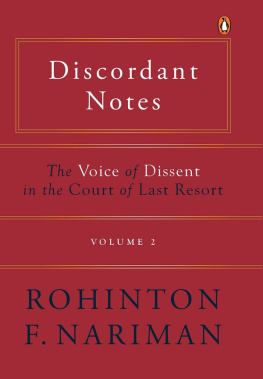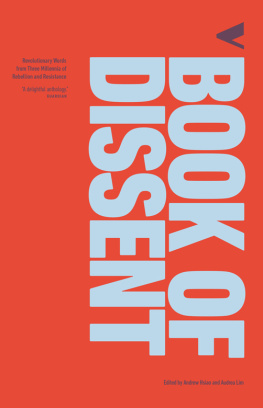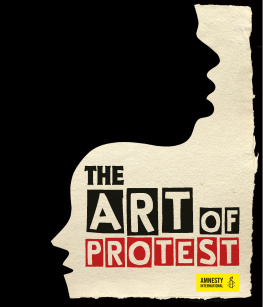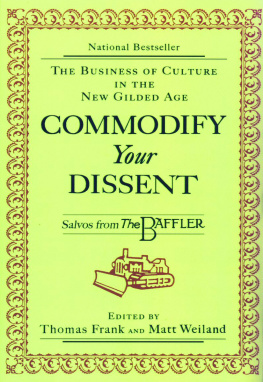The Solitary Voice
of Dissent
Using Foucault and Giddens
to Understand an Existential Moment
Martin Kay
Copyright 2016 Vernon Press, an imprint of Vernon Art and Science Inc, on behalf of the author.
All rights reserved. No part of this publication may be reproduced, stored in a retrieval system, or transmitted in any form or by any means, electronic, mechanical, photocopying, recording, or otherwise, without the prior permission of Vernon Art and Science Inc.
www.vernonpress.com
In the Americas: Vernon Press 1000 N West Street, Suite 1200, Wilmington, Delaware 19801 United States | In the rest of the world Vernon Press C/Sancti Espiritu 17, Malaga, 29006 Spain |
Library of Congress Control Number: 2015948249
ISBN: 978-1-62273-092-6
Product and company names mentioned in this work are the trademarks of their respective owners. While every care has been taken in preparing this work, neither the author nor Vernon Art and Science Inc. may be held responsible for any loss or damage caused or alleged to be caused directly or indirectly by the information contained in it.
Dedication
For my father
JOHN KAY, 1922-2014
Table of Contents
Preface
This book was written in the mid-west of Ireland and, initially, from a field of view that was limited to that general region. This is because my interest in solitary dissent started with my own experience, in 2014, of feeling an obligation over a period of time to reject the official account of a particular incident affecting part of the City of Limerick. Having recognised something distinguishable and worth exploring further, I then looked around me and found a broadly similar sequence in the experiences of another who lived in Co Galway, just one hundred kilometres to the north.
Here, I need to say that I was always looking for written material describing a recent pattern of events and objection in effect, a considered statement of evidence, something that could be repeatedly cross-examined in the same way that my own dissent had been declared and set down in print. This was, I felt, because people generally can be uncomfortable about engaging in oral interview and cross-questioning on deeply personal aspects of their lives and may introduce new barriers whereas the voice in print, once impelled to speak out on the record, has no such inhibitions. The conclusions can then be made available to others, from evidence they can reliably interrogate in turn. It has to be asked, nevertheless, whether I was personally apprehensive, having already put myself out on a very public limb, about face-to-face encounters. Did I, for example, feel safer with investigation at arms length? That is a valid thought to bear in mind because being a solitary dissenter is not comfortable. It is unsettling and a sense of fear in the background does not immediately die down. This may, in turn, induce artificialities to cover gaps in later reasoning. It follows that investigation at arms length may work to advantage by tending to stabilise, by slowing the investigation down to a steady walking pace.
Before long, I began to recognise a common trait among solitary dissenters which did build my own confidence. They all appear to write as honestly as they can in order to defend their situation before as wide an audience as possible and to lighten the burden of their inevitable alienation from whatever context they can no longer support. Such candour is almost a self-preservation mechanism to release the individuals accumulating upset by putting it firmly and respectably on the record and then attempting to move on.
This is very healthy and normal really, and probably consistent with the course of action any counsellor would advise the ill-at-ease to undertake. But what my case studies have revealed is also very accessible for being in this form and equally illuminating because it allows time for the reader to think and re-trace steps without losing any detail. It seems worth adding, too, that I was not attempting to deconstruct these written accounts but to get at the areas of concern or insecurity which caused them to be written. It was the separate approaches of Foucault and Giddens which ensured that my approach to those concerns was consistent.
Notwithstanding my attempt to remain rigorous and independent, however, I could not escape the fact that I was Case Study 1. There is, therefore, a methodological health warning about my own account, which I comment further upon, and have attempted to contain, in Chapter 2.
My second Case Study, in Co Galway, was unknown to me personally although I was aware of his name and, from media reports, of a little about the difficulties he had been having. But whereas I was involved in community safety and council issues, he, being a priest, was involved in spiritual health and church issues. So, we were different types of people, which was a good thing, but essentially travelling parallel paths, which was even better. This priest was initially cautious but became supportive before moving on to more pressing issues in his fractured career. I have had no further contact with him.
In order to try and broaden further the basis for conclusions based upon these two, initial case studies, I began to widen the radius of research. I approached one ex-junior minister in Dublin who, by my estimation, had declared her solitary dissent from the actions of her departmental leader, a member of the Irish Cabinet. I was particularly keen to attract her interest in order to avoid accusations of gender bias. But I received no reply. To be fair to the lady in question who had lost her Party whip, she was occupied within her constituency with the imperative of retaining her seat as an Independent at the forthcoming general election.
Furthermore, I came to the conclusion that politicians were probably unreliable as raw material in an investigation such as mine: I sensed that there could often be an undisclosed agenda between the answers that might be given and the real reasons for declaring dissent . So, I deliberately avoided the class thereafter, persuading myself that lesser mortals, who lived their lives away from the public eye and had no need to gate-keep 1, would be more candid and useful. I was not disappointed.
Very quickly, my search took me to London where I had been attracted by the plight of a senior journalist from a very well-known broadsheet. For a period, however, I could obtain no answer from him: I could neither find a point of contact or address, nor get a response from the staff of a magazine I knew he contributed to. Finding no other current candidates, I felt that the investigation had reached as far as it could. Suddenly, however, after some two months of silence, I received an encouraging email from my journalist, Case Study 3, by which time I had discovered, to my great delight, that he, too, had committed his dissent to paper and made it available to whomever wished to read further into a separation that had since become public knowledge. He was immediately supportive and remained so, although contact has lapsed.
The next difficulty was probing further into the consciousness than the written statement of dissent allowed. This is a limitation of my investigation which I have already flagged up: people are reluctant to engage in conversation about the deeply personal and have other distractions. Case Study 2, whose national profile was substantial, evidently had better things to do and I was embarrassed about asking a man more questions about his early experience of a world he had ritually and professionally eschewed, than he had already chosen to answer. Case Study 3 had already gone as far as he needed to and, demonstrably, was difficult to contact. Furthermore, he evidently had a thriving social life (he captained an English cricket team which even played in Ireland) and his act of solitary dissent was, as far as I could tell, history to him and best consigned there. That left me, therefore, with my own personal baggage to sieve for other fine evidence which actually served in the end to enrich the challenge of describing how to pin down the real reasons why a solitary voice has spoken out.













